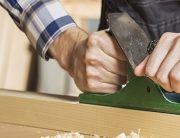Job Description
From the homey golden tones of a harvest table in your kitchen to the deep, dramatic mahogany of the dresser in your bedroom, the stain you choose has to match the personality of a piece.
Here at Beaver Creek Home Center, we want your stained surfaces to be satiny smooth and richly hued. Of course, that means you need to run through a few critical steps before you get to the fun part.
Here’s how to prep your projects before breaking out the stain:
- Even out the surface: Now is the time to give your project a careful examination so you can fill any cracks, holes, or splits in the wood. Choose a filler that’s stainable, so you don’t end up with unstained marks on your finished project.
- Smooth it with sandpaper: It can be tempting to skip this step if your wood looks smooth and even, but sanding is so important if you want a beautiful finish. It removes the dried bits of wood filler, polishes away any little scratches, and actually opens the pores of the wood so it’s ready to soak in the stain.
- Wipe it down: Once you’ve finished sanding, you need to remove the dust so it doesn’t gum up your stained project. Skip the dry cloth in favour of a cloth that’s just barely damp, or use a sticky tack cloth that’s designed to remove dust and dirt from a surface.
- Organize your staining area: Stain emits fumes that can be dangerous in an enclosed space, so you should work in a well-ventilated area — ideally in a garage with the doors open, to protect your project from the elements.
- Do a test patch: Crack open the can of stain and grab your brush or sponge, but don’t go wild just yet. It’s a good idea to test the stain on a hidden area of your project, like the bottom or underside.
Even when you’re really eager to tackle a staining project, try to choose a day that’s not too humid (or too cold) so the stain can be applied and dry evenly. You’ll really see the difference in your finished project.
Happy staining!




